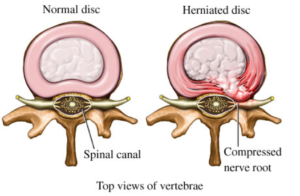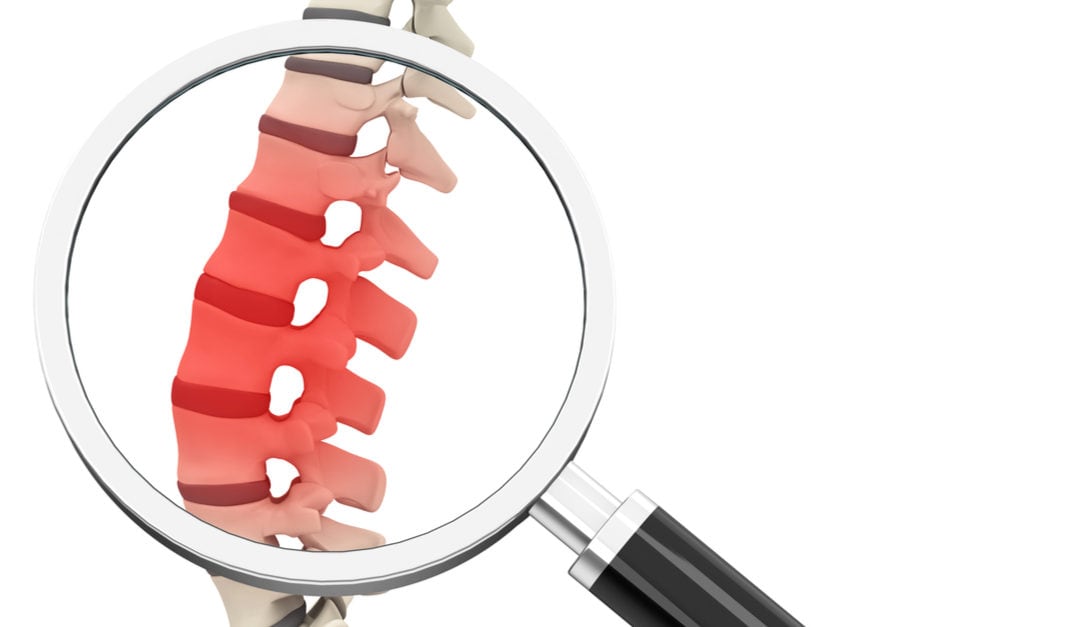The intervertebral discs are soft, rubbery pads that sit between adjacent vertebrae. They evenly distribute stress placed on the spine and help it flex. When one of the discs slips or herniates, it protrudes into the spinal canal and compresses the spinal nerve, which can cause pain, weakness, and numbness in the back and/or legs. The three most common reasons for a slipped disc are:
A Patient Has Degenerative Disc Disease
The intervertebral discs of aging peoples, especially those over 50, lose water content and shrink in what is known as degenerative disc disease. As discs shrink, the space between adjacent vertebrae decreases, which makes spine flexing, bending and twisting much harder. Because of this, the discs of patients with degenerative disc disease are more likely to have a slipped disc than those of patients without the condition.

Illustration 1- A normal disc vs. a slipped disc or herniated disc
A Patient is Overweight
Excess body weight places pressure on the spine and its muscles and ligaments. Patients who remain overweight for an extended period of time may experience:
- A change in posture. The curvature of the lower back increases and the pelvis tilts too far forward.
- Overweight patients who live a sedentary lifestyle may experience a decrease in bone density and develop osteoporosis.
- When too much pressure is placed on the intervertebral discs, the space between adjacent vertebrae narrows and osteoarthritis develops.
Any, all, or any combination of these factors increases the likelihood of a disc slipping.
A Patient Lifts an Object with Improper Form
When someone bends at the waist to lift a heavy object, they place a tremendous amount of pressure on the intervertebral discs of their lower back (lumbar spine), which may cause them to slip. Instead of bending at the waist, it’s recommended that people bend at the knees. Lifting in this manner allows heavy objects to be lifted using the large, strong muscles of the legs, buttocks, and upper back.
What to Do If You Think You Have a Slipped Disc
Neurosurgeons are highly trained, skilled, and experienced medical professional that treat all spine injuries and conditions, including slipped discs. If you can relate to the information in this post, please don’t hesitate to contact our office to arrange an appointment with one of our spine specialists. We’re currently accepting new patients and will get you in ASAP.
Dr. Patrick Senatus is a Board Certified Neurosurgeon in New York City with extensive experience in Minimally Invasive and Restorative Spine Surgery. Dr. Senatus employs a personalized patient-centered approach that prioritizes optimum functional outcome and well-being. Each consultation begins with a comprehensive evaluation by Dr. Senatus designed to create an individualized evidence based treatment plan which includes the patient, family, and collaborating providers.
Following a conservative treatment philosophy, Dr. Senatus offers his patients solutions using the most advanced minimally invasive spine surgery. His approach is to perform the most effective and least invasive intervention available, specifically tailored to each patient, guided by the principal that surgical options be considered only after all reasonable non-operative therapies have been exhausted. Returning his patients to a functional pain free lifestyle is the ultimate objective. Contact us today to schedule an appointment!


Recent Comments